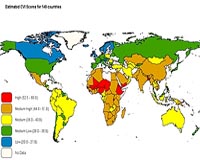| . |  |
. |
Geneva (AFP) Sept 3, 2009 The world is speeding towards a climate catastrophe, UN chief Ban Ki-moon warned on Thursday, urging rapid progress in talks to cut emissions and tackle global warming. "Our foot is stuck on the accelerator and we are heading towards an abyss," the UN secretary general said in a speech to the World Climate Conference. Ban, who this week visited the Arctic to witness first hand the changes wrought by global warming, warned that many of the "more distant scenarios" predicted by scientists were "happening now." "Scientists have been accused for years of scaremongering. But the real scaremongers are those who say we cannot afford climate action -- that it will hold back economic growth," he said. "They are wrong. Climate change could spell widespread disaster," Ban warned. The UN leader pinned his hopes of a breakthrough on a summit of world leaders in New York on September 22 to discuss climate change. Talks on an agreement to extend the Kyoto protocol on emissions cuts in time for December's Copenhagen conference had been too limited and slow, he said. "We have 15 negotiating days left until Copenhagen. We cannot afford limited progress. We need rapid progress," he added, criticising "inertia" towards climate change. "In New York, (I) expect candid and constructive discussions. I expect serious bridge building. I expect strong outcomes," Ban told delegates and ministers from some 150 countries at the meeting in Geneva. The UN chief warned that the price of failure in Copenhagen would be high "not just for future generations, but for this generation." Ban later reiterated that a pledge by the G8 leading industrialised countries this summer for a long-term 80 percent cut in emissions by 2050 was not sufficient. "I continue to believe that they should have a mid-term target, I'm going to continue on that with the G8 and G20 (leading economies)," he told journalists. Visibly sobered by his Arctic visit, Ban warned that rising sea levels, partly generated by melting ice, would threaten major cities and potentially up to 130 million people. The melting was also triggering a rush for natural resources in the Arctic, "altering the geopolitical landscape," not just the environment, said Ban. He urged action on the key areas of the Copenhagen negotiations that are riven by disagreements between rich, emerging and poor nations. They include measures to adapt to climate change and "fast-track funding" to help the most vulnerable and developing countries. In Ethiopia, Prime Minister Meles Zenawi warned that African nations would walk out of the Copenhagen talks if their demands, notably on funding, were not met. While developed nations need "ambitious mid-term" emissions targets, Ban said developing countries also "need to act to slow the growth of their emissions." US officials in Geneva signalled that the Obama administration's policies for Copenhagen have yet to be "refined and defined," and notably suggested that help for poor countries needed more attention. "That is something we are looking at," said Maria Blair, deputy associate director for climate change adaptation at the White House environment council. China maintained its stance for Copenhagen. "The developed countries should continue to take the lead in undertaking quantified emission reductions commitments, and the developing countries should make contributions as their ability permits," said Chinese Vice Premier Hui Liangyu in Geneva. In India, a government-backed report released Thursday said the country's per capita greenhouse gas emissions were expected to nearly triple in the next two decades. With its massive population, India is is one of the top polluters in the world. It is also among countries that have long rejected binding carbon emission targets on the grounds that they would hinder economic development.
Share This Article With Planet Earth
Related Links Climate Science News - Modeling, Mitigation Adaptation
 Albania to Zimbabwe: the climate change risk list
Albania to Zimbabwe: the climate change risk listParis (AFP) Sept 2, 2009 Africa and much of south Asia face extreme risk from climate change but top carbon polluters will be relatively shielded from its ravages, according a ranking of 166 nations obtained by AFP Wednesday. Somalia, Haiti and Afghanistan top the Climate Change Vulnerability Index, calculated from dozens of variables measuring the capacity of a country to cope with the consequences of global ... read more |
|
| The content herein, unless otherwise known to be public domain, are Copyright 1995-2009 - SpaceDaily. AFP and UPI Wire Stories are copyright Agence France-Presse and United Press International. ESA Portal Reports are copyright European Space Agency. All NASA sourced material is public domain. Additional copyrights may apply in whole or part to other bona fide parties. Advertising does not imply endorsement,agreement or approval of any opinions, statements or information provided by SpaceDaily on any Web page published or hosted by SpaceDaily. Privacy Statement |